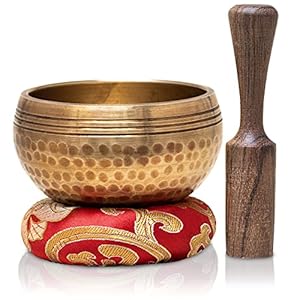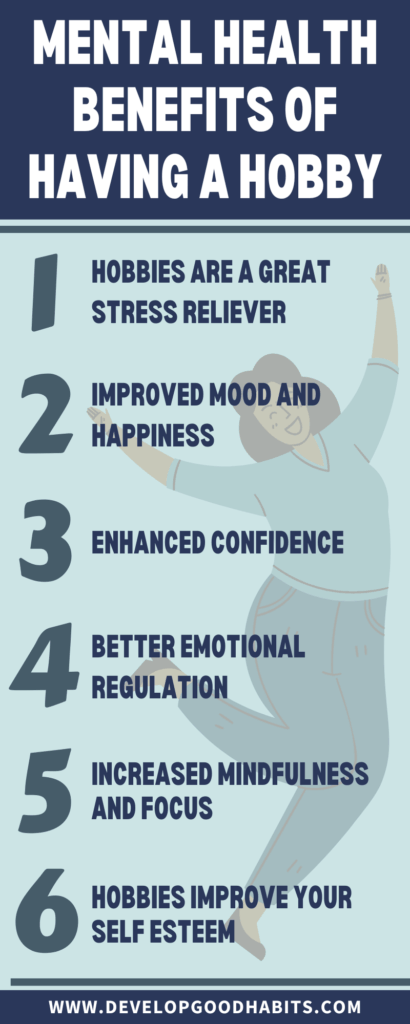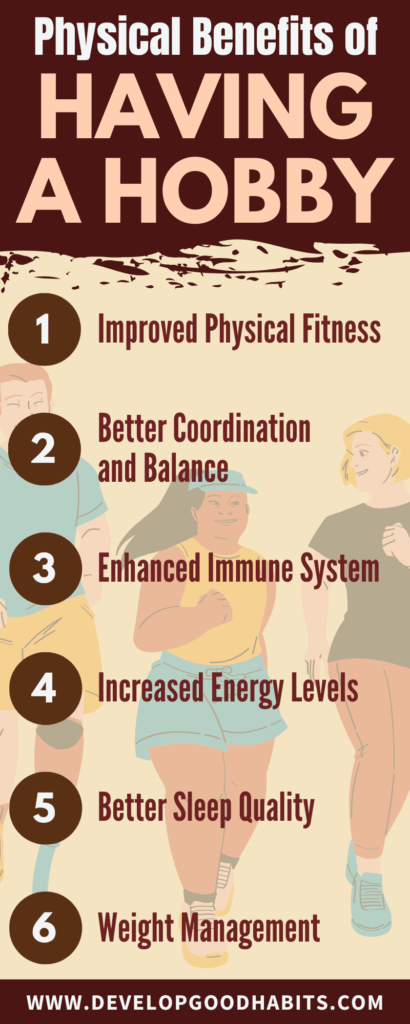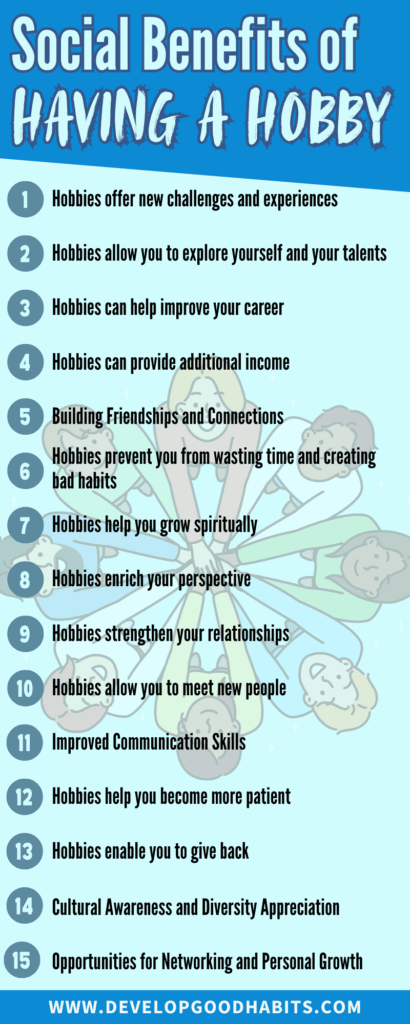Engaging in a hobby or leisure activity offers far more than just a way to pass the time—it can be a powerful investment in your overall well-being.
The benefits of hobbies are quite varied, from improving mental and emotional health to strengthening the body and mind. Whether it’s a specific activity like painting, hiking, or volunteering, hobbies can enhance cognitive health, build social connections, and contribute to good health and even a longer life.
The benefits of having a hobby extend across multiple areas of life. Including:
- Hobbies include mental and emotional health
- Hobbies improve physical health
- A hobby will improve skill development
- Hobbies improve social enrichment
By making time for enjoyable and meaningful pursuits, individuals can create a more balanced, fulfilling, and healthier lifestyle.
Now, if you’re still uncertain about “why” you should engage in a fun, recreational activity, then I recommend you check out the rest of this article where we talk about 33 benefits of having a hobby (and also, take a look at these hobbies for men and these hobbies for women.)
(Side note: Another positive way to improve your life is to read and learn something new every day. A great tool to do this is to join over 1 million others and start your day with the latest FREE, informative news from this website.)
Why Hobbies are Important
Hobbies are important because they provide meaningful ways to use leisure time that support both mental and physical health benefits.
Even when people have little time, engaging in enjoyable activities can improve mood, reduce loneliness, and create a sense of purpose. Whether it’s exercising, reading, gardening, or trying different things, hobbies encourage balance and relaxation while promoting better health overall.
A hobby can also help prevent issues like obesity by keeping the body active, while the social benefits of group activities foster connection and belonging.
Ultimately, hobbies enrich life by nurturing the mind, body, and relationships in ways that contribute to lasting well-being.
Mental Health Benefits of Having a Hobby
The psychological benefits of having a hobby are especially significant for older adults, as engaging in enjoyable activities can enhance mood, reduce stress, and promote a greater sense of purpose and well-being.
While having a hobby may not combat mental illness directly. Having a hobby helps give you focus that may keep you away from some of the anxiety and stress of mental health.
1. Hobbies are a great stress reliever
Your hobby should be a completely pleasurable activity that allows you to take your mind off of the demands of your daily life or negative emotions. It’s a healthy and productive distraction from work or personal troubles.
While adding an activity to your list of things to do might seem like it could create more stress, I’ve found that it is actually a great outlet for releasing stress. When you focus on a non-work-related task and you are able to get into the flow of it, all of your stress levels seem to fade away.
2. Improved Mood and Happiness
Doing something you love releases dopamine and endorphins, the brain’s “feel-good” chemicals.
Whether it’s cooking, crafting, or playing a sport, hobbies provide a sense of joy and satisfaction. This consistent boost in mood can help combat feelings of sadness or irritability.
Over time, people who regularly engage in hobbies often report higher overall happiness and life satisfaction.
3. Enhanced Confidence
Mastering new skills or improving at a hobby can greatly enhance one’s self-esteem. Each small success—like finishing a puzzle, learning a song on the guitar, or growing a healthy plant—builds confidence and pride.
This sense of achievement reinforces positive self-belief and encourages perseverance. As confidence grows, it often spills over into other areas of life, improving overall mental well-being.
4. Better Emotional Regulation
Hobbies provide a safe outlet for expressing and processing emotions. Creative activities like journaling, painting, or playing music can help people articulate feelings that are difficult to express verbally.
This process can lead to greater emotional awareness and stability and even fewer symptoms of depression. Over time, individuals learn healthier ways to cope with frustration, sadness, or anger due to positive emotions from engaging in hobbies.
5. Increased Mindfulness and Focus
Many hobbies, such as yoga, knitting, or woodworking, require concentration and presence in the moment. This focus encourages mindfulness, helping individuals quiet racing thoughts and become more aware of their surroundings.
Practicing mindfulness through hobbies can reduce anxiety and improve mental clarity. It also fosters a deeper appreciation for the present, which supports emotional balance
6. Hobbies Improve Your Self Esteem
Pushing your limits and getting out of your comfort zone will help you build your self-esteem as you achieve things you thought were not possible. Each time you progress with your hobby, you are pushing yourself more into a mentality of being able to accomplish anything.
You feel good about yourself when you’re good at something. Of course, there is a learning curve to any activity, but once you are able to get to the point where you are confident about what you are doing, you will find success in your journey and feel a sense of internal motivation to continue.
Physical Benefits of Having a Hobby
Engaging in regular physical hobbies, such as swimming or dancing, can help lower blood pressure and cortisol levels, reduce heart rate, and decrease the risk of heart disease or stroke over time.
7. Improved Physical Fitness
Active hobbies like swimming, hiking, dancing, cycling, or even simply walking every day will help strengthen muscles, improve endurance, and boost overall cardiovascular health.
Regular participation keeps the body moving, which supports long-term physical wellness and reduces the risk of chronic diseases.
8. Better Coordination and Balance
Hobbies that require precise movements—such as yoga, martial arts, or playing a musical instrument—enhance motor skills, hand-eye coordination, and body awareness. Over time, this can improve balance, agility, and overall physical control.
9. Enhanced Immune System
Physical activity from hobbies helps regulate the immune system by reducing stress hormones and promoting better circulation. Outdoor hobbies like gardening or walking in nature can also increase vitamin D exposure, which supports immune function.
10. Increased Energy Levels
Engaging in enjoyable physical activities boosts blood flow and oxygen levels in the body, helping to fight fatigue. People who regularly participate in active hobbies often experience get more energy throughout the day and improved stamina.
11. Better Sleep Quality
Physical hobbies help regulate sleep patterns by reducing stress and promoting relaxation. Moderate exercise through hobbies like jogging, yoga, or even dancing helps the body unwind, making it easier to fall asleep and stay asleep.
12. Weight Management
Active hobbies naturally help burn calories and maintain a healthy metabolism. Consistent participation in sports, hiking, or even brisk walking can help manage weight without the pressure of a strict workout routine.
Cognitive and Skill Development Benefits of Hobbies
The cognitive and skill development benefits of hobbies are closely tied to how activities like art making, exploring new topics, or engaging in related studies can sharpen the mind and strengthen a person’s sense of self through continuous learning and creativity.
13. Improved Memory and Concentration
Hobbies that require focus—such as puzzles, reading, or playing an instrument—help strengthen memory and concentration.
These activities stimulate the brain’s neural connections, improving cognitive processing and recall over time. By regularly challenging the mind, individuals can enhance their ability to stay attentive and retain information more effectively.
These mental exercise can even help slow cognitive decline as people age.
Check our these specific articles for games to improve memory:
14. Hobbies encourage you to take a break.
Hobbies offer you an opportunity to take a break, while also giving you a sense of purpose. If you’re like me, you probably like to feel productive no matter what you are doing. If you are engaged in an activity, you don’t want to feel like you are just spinning your wheels.
A hobby gives you that sense of purpose.
You are able to do something while still having fun. Also, the more you do a hobby, the more you are likely to learn about the subject, which will provide you with an increased sense of life satisfaction. Maybe you want to learn a new language or learn to write Chinese characters. The more you engage in your hobby, the more you will learn.
15. Enhanced Problem-Solving Skills
Many hobbies, like chess, coding, or crafting, encourage strategic thinking and creative problem-solving.
When faced with challenges, hobbyists learn to analyze situations, consider alternatives, and find effective solutions. This process strengthens critical thinking and adaptability. Over time, these skills can transfer to real-life situations, improving decision-making and resilience.
16. Boosted Creativity and Innovation
Creative hobbies such as painting, writing, or photography stimulate imagination and innovation. They allow individuals to think outside the box, explore new perspectives, and express themselves in unique ways.
Engaging in creative processes also enhances cognitive flexibility—the ability to switch between different ideas or approaches. This creativity can carry over into work, school, and personal problem-solving.
Even something as simple as art therapy, which could be as simple as doing some adult coloring pages could be a good hobby to boost your creativity.
17. Development of Fine Motor Skills
Hobbies that involve precise hand movements—like knitting, woodworking, or playing a musical instrument—improve fine motor coordination. These activities strengthen the connection between the brain and muscles, enhancing dexterity and control.
Over time, this can lead to better hand-eye coordination and improved physical precision. Such skills are beneficial not only for the hobby itself but also for everyday tasks.
18. Increased Learning Capacity
Hobbies often require learning new information, techniques, or tools, which stimulates the brain and enhances its capacity to absorb knowledge.
Whether it’s learning a new language, mastering photography, or experimenting with cooking, the process of acquiring new skills keeps the mind active and engaged.
This continuous learning promotes cognitive growth and mental agility. It also encourages curiosity and a lifelong love for discovery.
Social Benefits of Having a Hobby
Engaging in hobbies, such as listening to your favorite podcast or exploring other group activities, can inspire creativity, reduce stress, and even enhance focus and productivity in your professional life. Let’s look at some of the specific social benefits of hobbies.
19. Hobbies offer new challenges and experiences.
Work-related challenges are often accompanied by stress and the pressure to be the best at what you are doing. With a hobby, you can enjoy the process of learning something new without feeling discouraged at being bad at it in the beginning. It can even help you get out of your comfort zone.
A hobby can also offer you different types of challenges than you are used to. While you may spend your days at work being challenged mentally, you can take up a hobby that can challenge you physically, such as rock climbing or kayaking.
20. Hobbies allow you to explore yourself and your talents.
You never really know what you’re capable of unless you try something. You may surprise yourself and discover some hidden talents. For example, you might assume that you would never be one to take up golf because you find it is boring to watch on television, and it seems like a slow way to spend your time.
But if you try it, you may discover that you love playing golf, and that you have a certain talent for hitting the golf ball correctly and being successful with the sport. Hobbies help you discover the things that you’re good (and bad) at, and might surprise you. Self discovery is especially important during the teenage years. Check out our roundup of fun hobbies for teens.
21. Hobbies can help improve your career.
While it may seem counterintuitive to make time for something outside of work in order to get ahead at work, career coaches have confirmed that having a hobby can help make you better at your job.
Having a hobby helps you learn how to handle work-life stress and think creatively. It also shows employers that you have passions and a drive to do something with your time. (Check out this list of creative hobbies!)
A hobby can also help decrease your chances of becoming burned out at work. If your entire routine consists of work and home, with no other stimulation to your brain, you are going to get bored. Having a hobby can help improve your focus and drive while you are at work because it will take away from the time outside of work that you are not engaging your mind.
So if you spend time after work focusing on riding your bike, you will give your mind a chance to focus on something specific instead of what happened at work that day. This can help you go back into work the next day refreshed and ready to succeed.
22. Hobbies can provide additional income.
You may find a hobby that you are good enough at that you can make sales for extra income. You may even get the chance to turn your hobby into a full-time job. For example, maybe you really like to garden, and you spend time keeping your garden well-manicured and healthy.
If you find that you really have a knack for that, you may offer garden design services to other people, which could turn into a full-time job. Even if it is just consulting, this would be one example of a great way to make some money off of a hobby.
23. Building Friendships and Connections
Participating in hobbies often brings people together who share similar interests, creating natural opportunities for friendship and social bonding.
Whether through a book club, sports team, or art class, shared activities help break the ice and foster meaningful connections. These relationships can provide emotional support and a sense of belonging.
Over time, hobby-based friendships often grow into lasting social networks that enrich one’s life.
24. Hobbies prevent you from wasting time and creating bad habits.
Hobbies help people avoid boredom. Boredom is actually responsible for a lot of the suffering in our society, and many of people’s destructive behaviors.
Having good hobbies to fill up free time makes people less likely to spend their idle time on negative activities or bad habits such as drinking, gambling, or drugs. Hobbies give you something to do when you are unable to find something to fill your time. They also give you something to look forward to.
As the old saying goes, “Idle hands are the devil’s workshop.” Hobbies keep you out of trouble, and help relieve boredom. So, rather than sitting around trying to find something to entertain you, you can jump back into your exciting hobby that makes you lose track of time completely.
25. Hobbies help you grow spiritually.
Just as your body is nourished through food and exercise, your soul needs to be nourished as well. This can happen through creativity and spiritual practice alike. Doing something that leaves you feeling inspired and recharged will help you apply those feelings to other areas of your life.
Feeding your soul spiritually involves regularly connecting with your higher power. Your best spiritual hobby will help you feel calm, peaceful, and purposeful. Hobbies you do by yourself alone are almost a form of meditation because they can help you relax your mind and connect with the higher power.
26. Hobbies enrich your perspective.
Having a new hobby can be very effective when it comes to building character. It enriches your life and provides you with a different perspective on things.
Regardless of what type of hobby you take up, you will certainly be exposed to new people and ideas. Having a hobby will help you grow in many ways, including exposing you to diversity, new opinions, and new ways to look at life.
27. Hobbies strengthen your relationships.
Once you find a hobby that you love, you can share it with loved ones, and spend more time together. Maybe your relationship with your spouse has become a bit dull and repetitive, and it is time to add that spark back in. If there is not a new hobby that you both want to start together, invite your spouse to join you in your current hobby. (We even compiled a list of fun hobbies can do together.)
Maybe you have developed a love for cooking. Ask your spouse to join you in the kitchen and see what you all can come up with together. This will help you spend time together while you are cooking, and then even more time afterward while you are enjoying whatever you decided to make.
28. Hobbies allow you to meet new people.
Mutual tastes in activities such as music, arts, and sports are one of the surest ways to connect with other people. Because of this, it makes sense to take up a hobby if you are looking to meet new people who have similar interests.
Hanging about with like-minded people who share your passions can turn out to be an effective way to increase your social circle.
Connecting with other people will help you learn new things and improve your skills while also making friends. One great hobby to take up to meet new people is dancing. Try out a salsa class or a different kind of dance that offers classes in your area so you will be able to see and interact with the same people each week.
If you need additional help making friends, then here are 35 places to meet new people.
29. Improved Communication Skills
Group hobbies encourage individuals to express their ideas, listen to others, and collaborate effectively.
Activities such as theater, team sports, or community projects help participants practice clear communication and empathy.
These interactions build confidence in social settings and teach how to navigate different personalities. As a result, hobbyists often become better communicators in both personal and professional environments.
30. Hobbies help you become more patient.
To develop a new hobby, you will have to learn how to do something that you may have never done before. There will be a learning curve, and it will require patience to build up your skills. It takes time to become good at something new. Hobbies teach you to be patient with yourself as you learn and grow.
Fishing is a great example of a hobby that teaches patience. While there is a learning curve to be good at fishing, there is also a lot of downtime during this sport where you are waiting for fish to bite, or looking for a good place to fish.
This requires patience, and will teach it. And you will feel rewarded for your patience once you are successful in catching a fish.
31. Hobbies enable you to give back.
There are a lot of hobbies that can give you various opportunities to help other people. Here are some examples:
- Become a mentor
- Teach a class
- Donate things that you make
- Donate your belongings that you do not need anymore
- Support troops with letter writing and other projects
- Walk animals at the local shelter
- Play music for other people
- Cook at a soup kitchen
- Volunteer with a search-and-rescue team
32. Cultural Awareness and Diversity Appreciation
Certain hobbies, like travel, cooking international cuisines, or learning new languages, expose people to different cultures and traditions. This exposure broadens perspectives and fosters appreciation for diversity.
Engaging with people from various backgrounds helps develop empathy and open-mindedness. Over time, these experiences promote inclusivity and global understanding.
33.Opportunities for Networking and Personal Growth
Hobbies often connect people across different professions, ages, and backgrounds, creating valuable networking opportunities. These connections can lead to mentorships, collaborations, or even career advancements.
Beyond professional benefits, networking through hobbies broadens one’s worldview and inspires personal growth. It encourages lifelong learning and adaptability through shared experiences and insights.
Final Thoughts on the Benefits of Hobbies
Now, if you’re looking for what to do next, then I recommend checking out the following posts that can help you identify a great hobby and learn how to master it.
Hope this post helped you understand “why” hobbies are important. If you found it to be useful, then please share with a friend or on your preferred social media platform.
See more posts to find your next great hobby:
Trending Products

Chimes Set of 4 – Handmade Wind C...

BEST 100 Daily Meditation Cards | A...
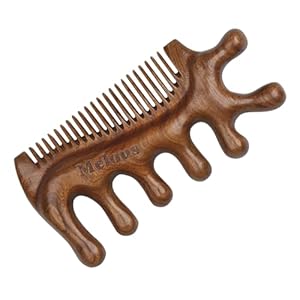
Melous 4 in 1 Sandalwood Gua Sha Ma...
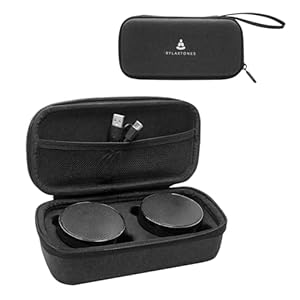
rylaxtones Carrying Case Travel Cas...

ProsourceFit Acupressure Mat and Pi...

Mindfulness Breathing Necklace Stre...

Woodstock Wind Chimes Zenergy Hand ...

ENFANTRY Breathing necklace Mindful...
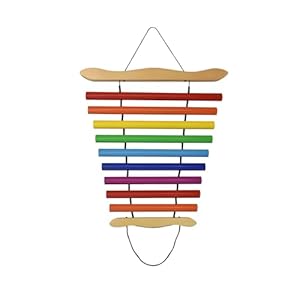
TNZMART Hanging 9 Note Sound Healin...
